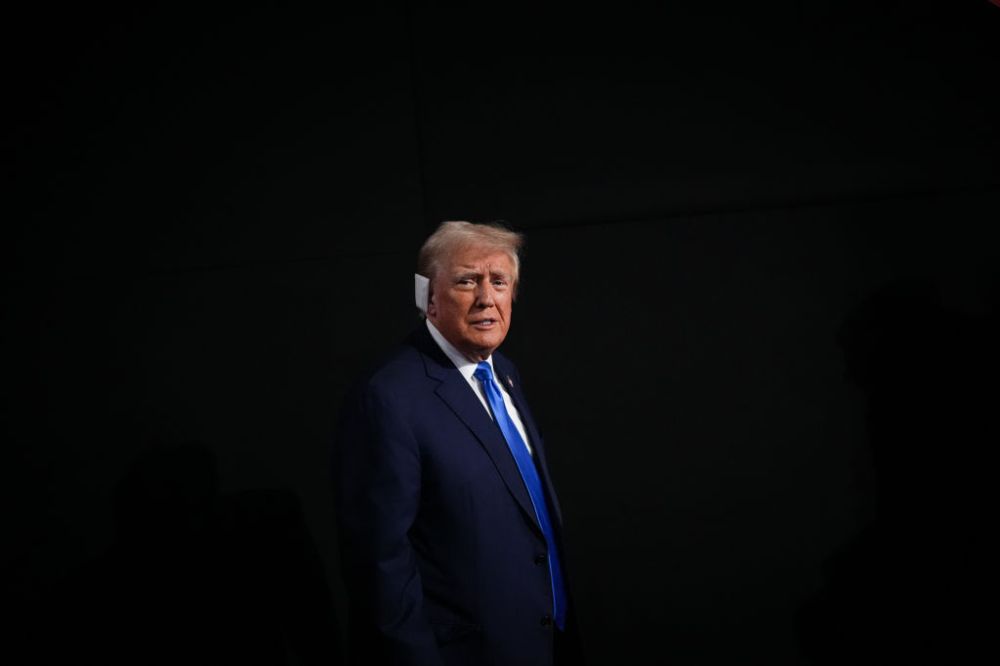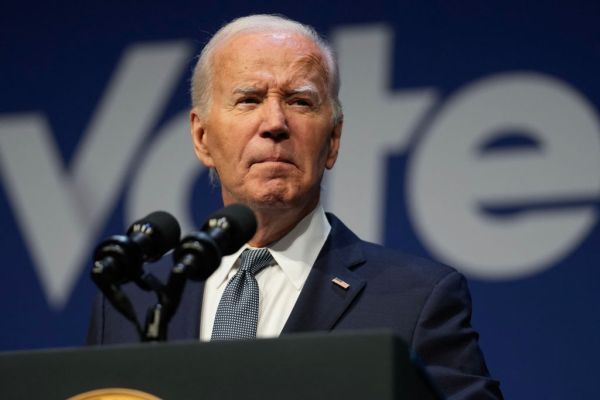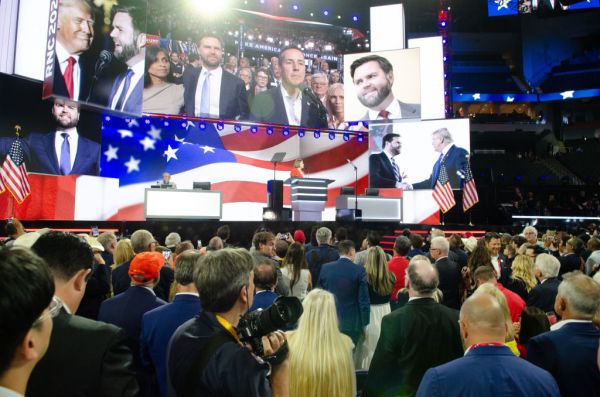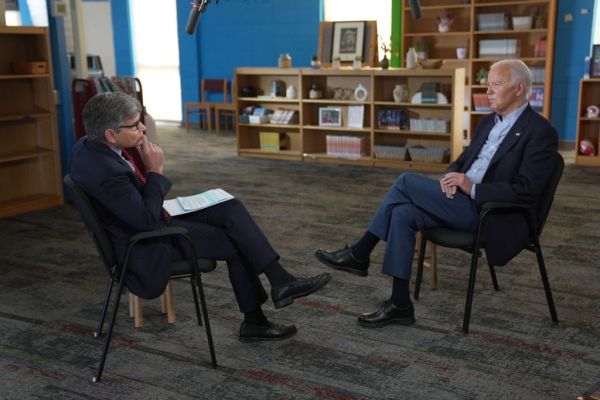I am not religious, but at this point you could probably convince me that we’re living in a simulation.
Too many wildly implausible things have happened lately to justify continued belief in reality as we’ve known it.
Take Matt Gaetz’s face.
I don’t know enough about makeup, Botox, and plastic surgery to explain how someone who appeared relatively normal on Tuesday when he almost got punched out by a delegate ended up looking like this when he addressed the Republican National Convention on Wednesday. But I can confidently say such things don’t happen naturally.
Perhaps the hidden hand behind our simulation is a fan of Las Vegas lounge acts and thought it’d be funny to turn one of the most obnoxious tough-guy populists in the party into Wayne Newton for a night.
Gaetz’s sudden transformation is minor evidence that reality is no longer as it appears. But over the last three weeks, major evidence has been abundant.
On June 27, the leader of the free world felt well enough that he and his team thought it’d be fine to send him out to debate before an audience of 50 million people. Then he stepped onstage and made word-sounding noises for 90 minutes.
A few days later, with a coup-plotter vowing “retribution” against his enemies ahead in presidential polls, the Supreme Court declared that presidents can commit all the crimes they want in the course of executing their core duties.
On July 13, that same presidential frontrunner literally dodged a bullet that was aimed at his brain, escaping death by millimeters.
Two days later, a judge in Florida dismissed serious criminal charges against him that legal experts far and wide had regarded as an open-and-shut case.
Then, on Wednesday, not long after saying that only a “medical condition” could drive him from the race, the president of the United States was diagnosed with COVID.
A few weeks ago, Joe Biden claimed that he’d stand aside as his party’s nominee only if “the Lord Almighty” told him to do so. I don’t believe in the Lord Almighty—but I do increasingly believe in simulations, and it sure seems like whoever’s behind the one we’re stuck in wants Donald Trump to be president again and to feel unrestrained to do his worst in a second term.
Does that explain why the stigma around reelecting him seems to be fading before our eyes? Fate demands a Trump restoration!
I think there’s more to it than that.
“Biden is so bad that he’s eroding the mainstream social taboo of being a Trump supporter,” podcaster Siraj Hashmi tweeted on Wednesday night. There’s more to it than Biden being “bad” too, but the diagnosis is spot on. There was a taboo of sorts around liking Donald Trump, even before January 6, yet in the last few months it’s begun to disintegrate.
The “vibes” around a second Trump presidency have shifted. Why?
The obvious place to start is with the most obvious explanation. Trump’s consistent lead in the polls has created a sense that victory is inevitable.
If you’ll indulge me in a tautology: The more thinkable something becomes, the more thinkable it becomes.
It’s hard to accept that a convicted criminal whose favorability rating has been stuck in the low-40s for a decade might be a shoo-in for the presidency—and in fairness, Trump isn’t quite a shoo-in. He’s never touched 48 percent against Biden in the national polling average, for instance.
But he’s led head-to-head every day this year. Ditto in the battleground states, where his advantage hovers steadily between 3 and 4 points. And there’s no reason whatsoever to think that his opponent is capable of closing the gap. Uniquely in modern presidential elections, we have a weak frontrunner facing an incumbent who’s so much weaker by comparison that his only plausible trajectory is downward.
If you doubt that, enjoy this clip from a new interview in which Joe Biden forgets the name of his own defense secretary and resorts to referring to him—I kid you not—as “the black man.”
There will be no Biden comeback. Insofar as there ever might have been a Biden comeback, it needed to begin on June 27 by doing well at the debate and showcasing the many risks of returning Trump to power. Instead, the president showcased the risks associated with his own reelection, leaving Trump to run effectively unopposed.
Voters like to be on the winning team, and the team that’s likely to win is now obvious. An unthinkable second Trump term has become thinkable, and the more thinkable something becomes, the more thinkable it becomes. No wonder the taboo around returning him to power is fading.
Biden’s increasingly grotesque senescence is weakening the taboo in other ways.
“You put a picture of Trump shaking his fist in the face of an assassin alongside a picture of Biden’s blank stare in the debate, and there you have the choice,” Republican pollster Whit Ayres recently told Ronald Brownstein. Some liberals agree: After news broke on Wednesday of Biden’s COVID diagnosis, Van Jones observed on CNN that “a bullet couldn't stop Trump. A virus just stopped Biden.”
Voters value strength in leadership, and Joe Biden is the picture of enfeeblement at the pitiful end of his long career. “Strong and wrong” usually beats “weak and right,” Brownstein noted, paraphrasing Bill Clinton. The more glaring the difference between the two candidates becomes, the more comfortable Trump skeptics will get with “strong and wrong.”
The most poisonous element of Biden’s deterioration, though, is the crisis of trust it’s created in him and his party. On Wednesday, the New York Times published an arresting detail about Democrats’ decline in the polls:
Even more concerning to Democrats is data they have received in recent days that reveals the extent of the political damage that could come to the party’s incumbents from remaining supportive of Mr. Biden, with one poll suggesting that voters are deeply distrustful of elected officials who vouch for the president’s mental capacity and endorse him.
Americans will believe a lot of nonsense from their leaders, as the last nine years of Republican politics demonstrates, but demanding that they doubt their own eyes and ears every time Biden speaks on camera post-debate has proved to be a bridge too far. The public now realizes, in Tyler Cowen’s words, “that he and his team [have] been running a con at least as big as the Trump one.” Instead of persuading leery voters, every Democrat who remains complicit in the great gaslighting effort around the president’s health has begun to come under public suspicion.
If we’re forced to choose between two con artists this fall, swing voters might reason, why not choose the one who can complete a sentence?
Democrats’ strongest argument against Trump is that he’s unfit for office morally, temperamentally, and psychologically. Once Biden’s own physical and mental unfitness became the central story of the campaign, that argument collapsed. The prospect of reelecting Trump became less mortifying as the prospect of reelecting Biden became more so.
The president’s infirmity accounts for much of the erosion in the taboo of backing Trump. But not all of it.
If Trump can’t be beaten in a contest over inherent fitness—and in the wretched simulation we’re in, he apparently can’t—then he should be beatable in a contest over governing competence and national harmony. One would think.
The movement he leads has radical plans for American government, and that includes the man who just became his running mate. Trump’s first term as president was low to medium chaos from Inauguration Day to Election Day 2020 and high chaos every day thereafter. Even a voter who finds him more cognitively fit for office than Biden might understandably bump up against a taboo about returning to a divisive “mean tweets” era that required an occasional impeachment and foiled coup attempt.
But that taboo is also eroding.
Partly it’s eroding because the image of Trump’s GOP as an outlet for white grievance has grown more complicated. That element does exist on the right (robustly) and national harmony would be imperiled by empowering it. But many polls suggest that Trump is building a meaningful constituency of black and Latino voters, especially among men, and might produce the best showing for a Republican among those demographics in years.
“Only racists support Trump.” What happens to that taboo as the hype grows about nonwhites giving Republicans a serious look? What happens to it when voters tune into the Republican convention and see J.D. Vance, the avatar of downscale rural populism, being introduced by his Indian American wife?
What’s happened to it as centrist supporters of Israel have watched the progressive vanguard stoop to antisemitic sloganeering and harassment in ventilating its support for Hamas? “A Charlottesville every day” on the left will naturally reduce the potency of accusations of racism against the right.
Joe Biden is not a radical—no 1,000-year-old man could be—but he’s been less willing to confront the radicals in his own base than he ought to have been. Just yesterday, his administration affirmed that it opposes state bans on gender-reassignment surgery for minors, a subject on which most voters align with Republicans. The president’s longstanding unpopularity placed him in a Catch-22 politically in which he couldn’t afford to alienate his left flank lest his numbers collapse, yet couldn’t afford not to alienate it by denouncing its radicalism emphatically for the sake of impressing swing voters.
Competence is the point on which it should be easy to maintain a strong taboo against Trump. To this day, after nine years of leading a major party, he still can’t discuss policy nuts and bolts in any detail. His most memorable moments as leader during a global pandemic involved touting phony miracle drugs and riffing on bizarre treatments. For all his bravado as a law-and-order figure, the final year of his term brought the largest mass demonstrations—and riots—America had seen in years.
But some of Biden’s failures have been egregious enough to weaken the taboo against gambling on Trump’s competence. Immigration is the obvious one: In time, Democrats’ negligence on border security during Biden’s term will be seen as a catastrophic political mistake on par with the “defund the police” hysteria of 2020. “If liberals insist that only fascists will enforce borders, then voters will hire fascists to do the job liberals refuse to do,” David Frum wrote presciently in 2019. The taboo against hiring fascists is crumbling before us as we speak.
Inflation isn’t the president’s fault (mostly) but it’s traumatic for the working class and a grave political wound given public ignorance about how it works. If all you know is that prices were low under Trump and high under Biden, you’ll never be persuaded that the latter is more competent than the former. The shambolic collapse of Afghanistan in 2021 is Biden’s fault (mostly) and it punctured the sense that an old pro like him would be a steady hand at the national wheel. It’s hard to convince voters that the guy who brokered the Abraham Accords would be a major step down from that.
There’s another reason Trump seems less incompetent than he used to be. It’s because he’s less incompetent than he used to be.
His political operation is considerably more professional than it was in 2016 or even 2020. That feels strange to say given how nutty many of his favorite cronies have grown over time, but it’s true. Susie Wiles and Chris LaCivita, his top advisers, are running an effective campaign; after Biden’s debate disaster, their candidate demonstrated uncharacteristic discipline in lying low while Democrats split bitterly over the president’s future. Even the convention program has been more astute than you might expect from an outfit that once famously held a press conference at a landscaping company. The highlight of night three was several Gold Star families making a devastating case against Biden over the human toll of his Afghanistan calamity.
In a few hours, we’ll find out if the excited babble earlier this week about Trump embracing a “national unity” message is true or not. It would be wildly out of character for him, but it would also be smart politics insofar as it would tantalize reluctant undecided voters with the prospect of a kinder, gentler MAGA in term two. He would never have been able to control himself sufficiently to deliver a message like that in 2016. This time, he might.
Which brings us to the last reason for the disintegrating taboo around his reelection.
Through sheer determination, the post-liberal right has moved the Overton window of what’s considered “normal” in American politics.
The last nine years can be viewed as a test of wills between liberals and illiberals on how wide that window should be. At every turn, Republicans have pushed to expand it. Impeachments, coups, insurrections, criminal charges, sexual abuse civil judgments: None of it is disqualifying in a presidential nominee.
That logic was bound to rub off on voters who aren’t Republicans themselves.
There’s an episode of South Park satirizing complacency about school shootings in which Stan’s mom is the only person in town who still finds them horrifying or even noteworthy. Everyone else has grown inured to the point of nonchalance, assuring her after each new massacre that she’s overreacting, possibly due to PMS.
In the end, worn down by the emotional toll that the shootings continue to take on her, she too retreats into complacency. Maybe she was overreacting, she concludes.
How many Americans, worn down by the excesses of Trumpist politics and the populist culture that supports it, are watching a unified party rally around him without a civic care in the world and thinking that maybe they’ve been overreacting?
Unity is appealing. So is a sense of political purpose. Republicans have both in abundance. Tens of millions of right-wingers, from Steve Bannon to Nikki Haley, have joined a community seeking to empower illiberalism, and that community seems like a hell of a lot more fun than the exhausted anti-Trump alternative.
An undecided voter will look at it and wonder: How dangerous can illiberalism really be?
The question might not even occur to younger undecided voters who, thanks to Trump enablers, have grown up with the political Overton window in a different place than it was for their parents. They have no classically liberal model of right-wing politics, so they have no reason to think the current illiberal version is in any way outré. Americans have been voting for Republicans for 160 years. Why would it be any less mainstream to do so now than it was before?
It won’t even occur to them that a taboo around Trump might, or should, exist.
All of which makes me even more confident that replacing Joe Biden with Kamala Harris on the ticket might help at the margins but ultimately won’t rescue Democrats. Beating Trump by making the election a referendum on him works only so long as the American public continues to treat such a thing as more or less unthinkable.
But the more thinkable something becomes, the more thinkable it becomes.







Please note that we at The Dispatch hold ourselves, our work, and our commenters to a higher standard than other places on the internet. We welcome comments that foster genuine debate or discussion—including comments critical of us or our work—but responses that include ad hominem attacks on fellow Dispatch members or are intended to stoke fear and anger may be moderated.
With your membership, you only have the ability to comment on The Morning Dispatch articles. Consider upgrading to join the conversation everywhere.